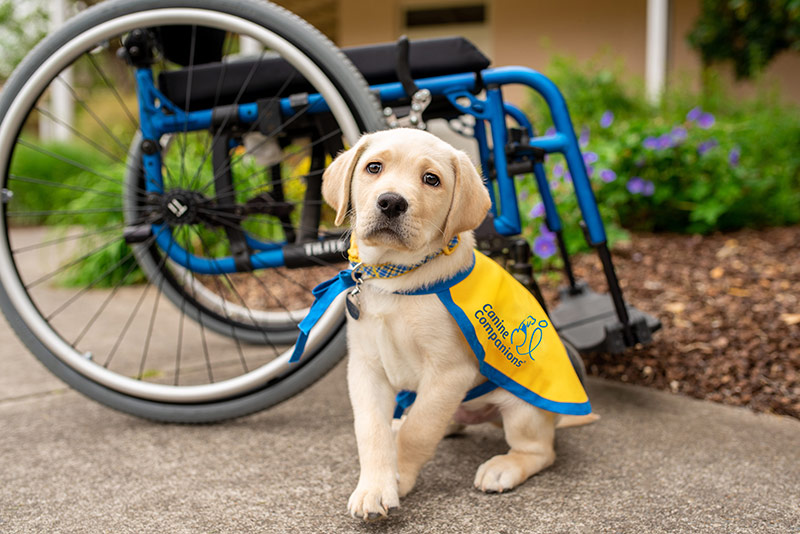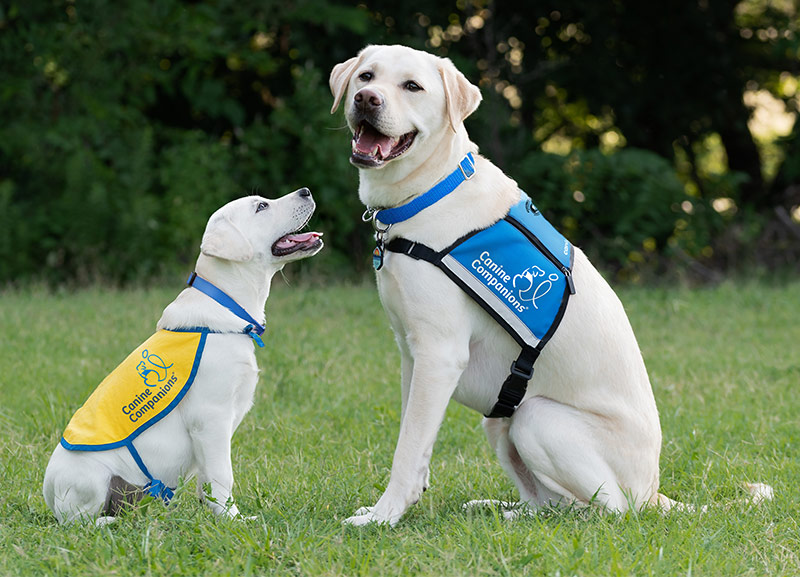
It is the oldest, largest, and longest national service dog provider in the country. Their goal is to empower those affected to be independent. The public relations director noted, “The heart and soul of the Canine Companion’s mission relies on supporters, staff, and volunteers that include breeder caretakers, puppy raisers, and puppy sitters”.
Military Press had the pleasure of taking a private tour of Canine Companions, which is based in Oceanside.
“Service dogs” are bred to have a temperament that is fearless, comfortable in big crowds, comfortable with noises, not scared of other people including children, or other dogs, and are trained with more than 45 tasks that include opening/closing doors, turning on/off lights, and picking items up/off the ground. The “hearing dogs” are alert to important sounds, identify the source of sounds, and will lead the handler to the source. There are also “therapy dogs” that provide comfort in schools and hospitals.
The Oceanside campus is over 2 acres and includes an administration building, 2 training rooms, 12 dorm rooms, and 3 kennels that house 70 to 80 dogs. There is also a grooming room where the dogs are given baths, nail trims, and brushed. The Kennels are temperature controlled, each dog has a kennel mate, and even meditation music.

The process starts with filling out an on-line application. (Canine.org) Unfortunately, there is a waiting list of a few hundred people with a two-year waiting period. Applicants go through an extensive interview that includes phone calls, review of the living conditions, an in-person interview at the campus to make sure there are medical clearances, and to see if a service dog can help the applicant with their needs. Some humans fail if they cannot handle the demands of a dog.
In 2014 the Veteran’s Initiative was established to help veterans. (Canine.org/veterans) Canine Companions places service dogs with military veterans and veterans with disabilities entirely free of charge. Service dogs can assist veterans with a variety of physical, auditory, and trauma-related disabilities. The trained service dogs can perform physical tasks to enhance independence, including retrieving dropped items, opening doors, picking up prosthetics, and alerting a veteran with hearing loss to important sounds in their environment.
In 2018 a program was launched to directly place service dogs with PTSD veterans. Dogs are trained to identify each veteran’s unique stressors and perform tasks that directly disrupt escalation of symptoms, thus enhancing their quality of life. Tasks may be performed for anxiety, hypervigilance, and generalized fear. 100% of the veterans report their quality of life improved; 95% report a decrease in frequency and severity of PTSD symptoms once paired, while others report the veteran’s initiative pairing dogs with vets, helped them interrupt nightmares, alert to increased anxiety, and create a buffer in crowds.
The dogs must go through a rigorous process. Breeders are volunteers within Canine Companions at the Northern CA HQ in Santa Rosa. The breeds include yellow labs, black labs, golden retrievers, and crosses between labs and golden retrievers. The breeders are the ones to choose the name and the handler is asked not to change it.
Around 8 weeks, the dogs are sent out to puppy raisers across the country. They stay there until 16 – 18 months and then are sent to a regional training facility for professional training. Puppy raisers are volunteers. They must go to classes, where they are able to meet other puppy raisers where they learn how to teach the puppies sit, down, and even have the dog rest its head on their handler’s lap. Never can they be left unattended. If someone takes a shower or goes to the store the dog is left in the kennel. Puppy raisers use a piece of equipment that works like a bridle for a horse. Wherever the nose goes the body follows whenever the dog is on the Gentle Leader leash. They also use Kimble and positive reinforcement. Anyone who loves dogs and wants a fulfilling volunteer job should apply because there is a definite need for more puppy raisers.
Another volunteer job that needs people are puppy sitters. If the puppy raiser needs to go somewhere and cannot take the puppy there is a group of volunteers that can sit with the puppy, like a substitute teacher. They also must go through all the classes to learn how to make sure the puppies follow the rules. Many people who cannot commit to a whole year and half puppy raising do this instead. They want to get involved. They still need to apply and have a home visit. It is not counted against anyone if they are called but cannot do it at that time. At the end of the stay the puppy sitter fills out a form saying how it went including where they went, and how did the dog behave.
Once someone is chosen to get a dog, they will be invited to one of four team training where 10 to 12 people come on the campus to stay for two weeks. They interact with 10 to 12 dogs. Then the matching begins, seeing who is gravitating towards whom. Both choose each other with a 98% success rate. “The magic of the match” is seeing the bond between the recipient and the dog, the way they work together. The recipient works with 2 to 3 different dogs and are observed. They are revaluated again during team training. There is a two-week period where they start bonding, working together as a team.
While there, they can go to the break room. This is where humans spend time since it includes a full kitchen, and couches to hang out while getting to know each other. There is a graduation ceremony brunch where the puppy raisers and the graduates meet, reuniting raisers with the raised puppies. Puppy raisers during graduation hand over the leash to the human partner on stage. The graduate gets the puppy raiser’s information, and they can reach out if they so choose.
Anyone who wants to feel they are performing a beneficial act to help others might want to volunteer at Canine Companions. They will gain pride and feel rewarded as well as being able to get to know a furry friend. To find out how to volunteer go to the website at https://canine.org/get-involved/ways-to-volunteer/ .
